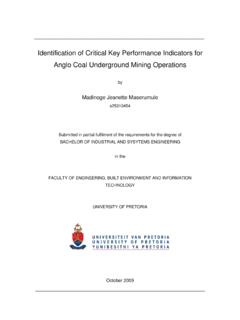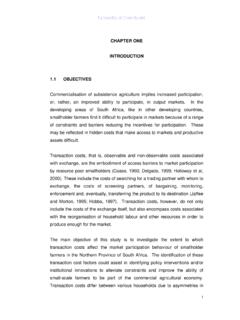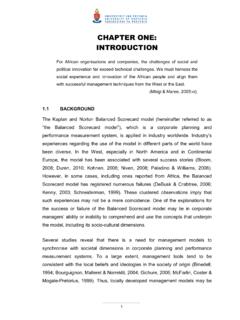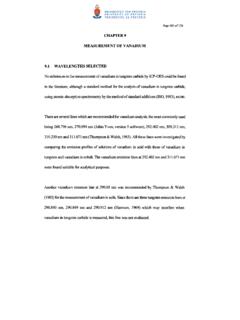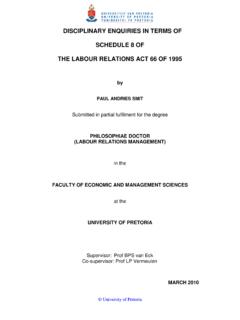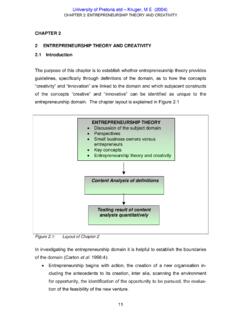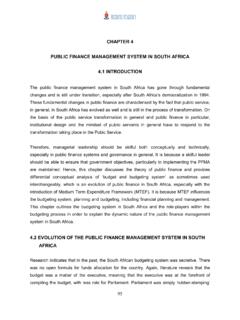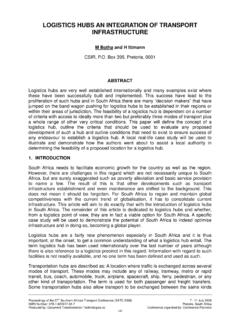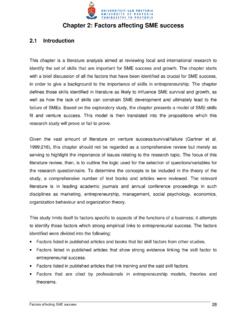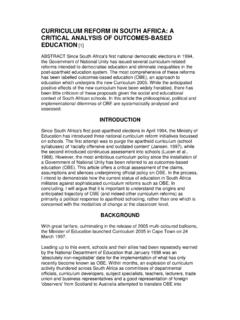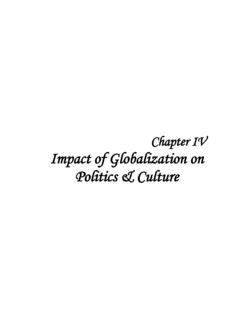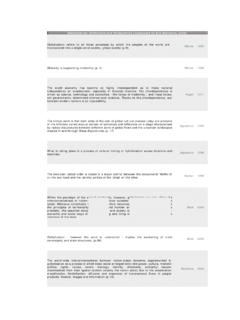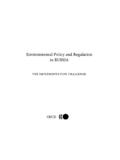Transcription of Public policy-making and policy analysis in South Africa ...
1 INTRODUCTIONhe Constitution of the Republic of South Africa , 1996 (Act 108 of 1996), paved theway for a truly democratic dispensation. This dispensation was based on princi-ples such as freedom of speech and association, freedom to assemble and respectfor life and property, as well as maintaining civilized standards and discipline. The 1996418 Journal of Public Administration Vol 37 no 4 December 2002 Public policy - making and policy analysis inSouth Africa amidst transformation, changeand globalisation : Views on participants androle players in the policy analytic RouxSchool of Public Management and AdministrationUniversity of PretoriaABSTRACT ince 1993/4 South Africa has been characterised by comprehensive politi-cal, constitutional and socio-economic transformation and change. SouthAfrica was also provided the opportunity to break away from the boundariesof isolation and to re-enter the global village.
2 Reforms of such a magnitudeinevitably leads to change and transformation in almost all spheres of governmentand administration, and consequently Public policy . This in itself placed a muchheavier burden on policy makers, and consequently those involved in the assess-ment of policies, because national policy to facilitate transformation and change,now also has to align with international global requirements and Public institutions to survive, grow productively and render quality servicesto the Public , the abilityto effectively formulate policies for change and on a con-tinuous basis also assess or analyse such policy initiatives, is of paramount impor-tance. This would imply that awareness, knowledge and skills are needed at alllevels in order to implement sound policies and make change happen . Abetterunderstanding of the Public policy - making process, the stakeholders involved, aswell as the role and responsibilities of those involved in policy assessment couldensure a greater degree of professionalismwhen Public policies are formulatedand the implementation of such policies , preceded by the 1993 Interim Constitution, indeed reflects a significantchange in political thought, if compared with the separate development policies of theprevious apartheid regime.
3 In contrast with previous constitutions, in which Parliamentwas the supreme authority, Parliament is now subordinate to the Constitutionand the1996 Constitutionis indeed the supreme law or authority in South reform of such a magnitude inevitably leads to change and transformationin almost all spheres of government and administration. There is hardly a functional areaof government not touched by the new generation of policy - and decision-makers inSouth Africa . From 1994 to 2000, twenty-four Green Papers and forty White Papers havebeen presented, which all contain major policy changes. Change and transformation arewithin this context also management issues that have and will become a way of such as globalisation , streamlining technology processes, shifting demographics,changing customer or client needs and expectations and international economic trendsare some of the forces necessitating continuous change in Public policy .
4 Public institu-tions are dynamic entities and an effective response to the impact of the forces ofchange, will determine survival and success. It appears that in South Africa , the isolationof the past and lack of competition has contributed to the lethargy and lack of com-petitiveness environment within which Public institutions are currently functioning. It isimportant to realise that if a Public institution is to survive, grow productively and ren-der quality services to the Public , the abilityto effectively formulate policies for changeand on a continuous basis also assess or analise such policy initiatives, is of paramountimportance. In practice this implies that awareness, knowledge and skills are needed atall levels in order to implement sound policies and make change happen . In this article the process of policy -makingand policy analysisare explored. In additionviews on the participantsin the process of policy - making and - analysis in a transformedand global society will be shared, as well as suggestions made regarding the supportiveroleof the policy analyst when Public policies for change are formulated.
5 BACKGROUND VIEWS ON THE EFFECT OF TRANSFORMATION,CHANGE AND globalisation ON Public policy ransformation is where a government, and consequently all the Public executiveinstitutions, virtually have to start from scratch, where the underlying vision, mis-sion and strategy is under scrutiny. Real transformation can only successfully occurwhen the majority of individuals in political and executive institutions change theirmindsets, behaviour and corporate culture is being reborn. Everything is involved name-ly, all structures and systems, management styles, core competencies and worker pro-files, even core outputs required. Transformation is therefore a much larger entity thanthe concept of change . In summary transformation entails the creation of a completelynew paradigm. RouxArticleIn contrast to transformation, and broadly speaking, change is a planned or unplannedresponse to pressures and forces.
6 Change may be regarded as a complex strategy intend-ed to change beliefs, attitudes, values and the structures of Public institutions so that theycan better adapt to new technologies, markets and challenges. It is about analysing thepublic institutions strategies and operations, planning and implementing alternativesand/or streamlining current standards in order to be more productive and effective in itsgoals and achievements (Swanepoel et al, 2000:753).As indicated in the introductory paragraph, constitutional reform has led to change andtransformation in almost all spheres of government and administration. Such changesaffected virtually all the functional fields of government, and consequently redefined therole of policy - and decision-makers. Some outstanding examples, to mention a few doc-uments and acts containing policies, which affected, and will affect in the future changeand transformation in particular, in South Africa , are: Chapter 2 & 9 of the 1996 Constitution White Paper on the Transformation of the Public Service(1995) White Paper on Human Resource Management(1997) White Paper on Affirmative Action(1998) Labour Relations Act, 1995 (Act 66 of 1995) Employment Equity Act, 1998 (Act 55 of 1998) Skills Development Act, 1998 (Act 97 of 1998)Although one can accept that the introduction of new executive and departmental poli-cies indeed reflects the values, norms and principles of the 1996 C o n s t i t u t i o n, the ques-tion remains as to whether these policies are cost effective and implementable, andwhether they will satisfy the needs of a transformed society?
7 Do Public officials properlyanalyse and scrutinise policies in order to determine whether policy options available areindeed the best and most cost effective? Will society benefit from, and can governmentafford, its policy agenda? Hopefully a better understanding of the process of policy for-mulation and policy assessment, as well as a redefined indication of the responsibilitiesof all the stakeholders in policy relevant issues, will provide answers to these for many years highly developed in terms of scientific and technological devel-opment, South Africa prior to 1994 was internationally isolated due to its policy ofapartheid. Sanctions had been introduced resulting in limited international trade andpolitical liaison. South Africa became unacceptable in terms of international standardsand lost its membership in the United Nations, as well as its various agencies.
8 SouthAfrica was further unwelcome as a member of the Organisation of African Unity (OAU)currently transformed into the African Union (AU) and its membership in theCommonwealth was cancelled (Thornhill, 2000:2). Since 1993/4 South Africa , in con-trast to other developing countries in Africa , was provided the opportunity to break awayfrom the boundaries of isolation and to enter the global village. 420 Journal of Public Administration Vol 37 no 4 December 2002 globalisation , which will be defined in more detail in a later paragraph, implied thatSouth Africa re-entered the international playing field. National policy directivesdesigned to facilitate transformation and change, now also had to align with interna-tional global requirements and demands. This in itself placed a much heavier burden onpolicy makers, and consequently those involved in the assessment of policies.
9 Also inthis regard a clear understanding of the role and responsibilities of analysts and partici-pants in the policy process could ensure a greater degree of professionalism when pu-blic policies are formulated and the implementability thereof, policy AND POLICYANALYSIS ne needs to understand concepts such as policy and policy formulation toconduct Public policy analysis . Before attempting to define policy , it should benoted that no administrative action can take place if specific goals and objec-tives have not been set. In practice, this implies that objectives will be set for each gov-ernment institution. The determination of goals and objectives, as well as the guide-lines , or policy , to follow to reach particular objectives, should be based on the actualneeds of , Public officials and political office bearers would become aware of deficien-cies in society. They would also become aware of areas in which government is not ren-dering a service it should have rendered.
10 After officials have gathered thorough informa-tion, it becomes possible for them to identify objectives. They can also indicate: whatis intended howto go about achieving the objectives by whatmeans ( resources and capital needed) the objectives will be this process, they will also consider: alternative possibilities or policy options the cost beneficial nature of different sets of role, which parliamentary portfolio committees and the joint standing committees ofparliament could play in this regard should be considered (see section 45 Constitutionof the Republic of South Africa , 1996).Once policy -makers have formulated a policy , the policy must be authorised. It can beargued that a policy becomes significant for the purpose of Public administration onlyafter legislation has been passed. Figure 1 shows this process of policy Roux422 Journal of Public Administration Vol 37 no 4 December RouxLet us consider the definition of policy as a function in more concrete terms.
